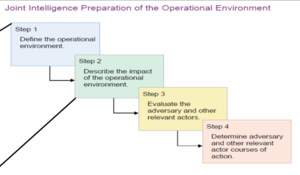Beyond PMESII: Advancing JIPOE for Integrated Campaigning

“Beyond PMESII: Advancing JIPOE for Integrated Campaigning“
Speaker: Pike, T. (National Intelligence University)
Date: 3 October 2019
Speaker Session Preview
SMA hosted speaker session presented by LTC Thomas Pike (National Intelligence University) as a part of its Future of Global Competition & Conflict Speaker Series. During part one of his two-part brief, LTC Pike focused on three findings from his dissertation: 1) The theoretical foundation (e.g., complex adaptive systems, complex systems, systems theory, complexity) of joint doctrine is strong; 2) The application of complex systems through the Joint Intelligence Preparation of the Operational Environment (JIPOE) can be improved by shifting from categorical description to the discussion of interdependencies within the operating environment; and 3) Uniqueness is a key feature of complex systems, which means that centrally derived solutions can support but never replace local leaders. After briefly reviewing the basics of JIPOE, LTC Pike used different types of finches to illustrate the difference between categories and interdependencies. He also stated that categories provide descriptions, while interdependencies provide operational insights. Moreover, it is important to note that influencing the adaptive path of the system is difficult and could be dangerous. LTC Pike then used Inchon, South Korea as a landing point during World War I and Anzio, Italy as a landing point during World War II to illustrate how seizing an enemy’s interdependency can lead it to fundamentally change its calculus. He also compared the relationships between the US’s government and military with the relationships between Pakistan’s government and military in order to illustrate how interdependencies influence system behavior. LTC Pike highlighted a series of policy implications as well, indicating that the relative size of a winning coalition determines whether the government distributes public goods or private goods. He then used a simulation involving Libya to illustrate this point and cautioned that the US’s strength can undermine its attempts to establish a democracy. Furthermore, the US must understand the interdependencies it creates and alters within a foreign population. To conclude, LTC Pike provided a series of recommendations for upgrading JIPOE, highlighting the need for the joint force to manage the analysis of relevant actor interdependencies to better understand links between behavioral trends and outcomes.
Comments